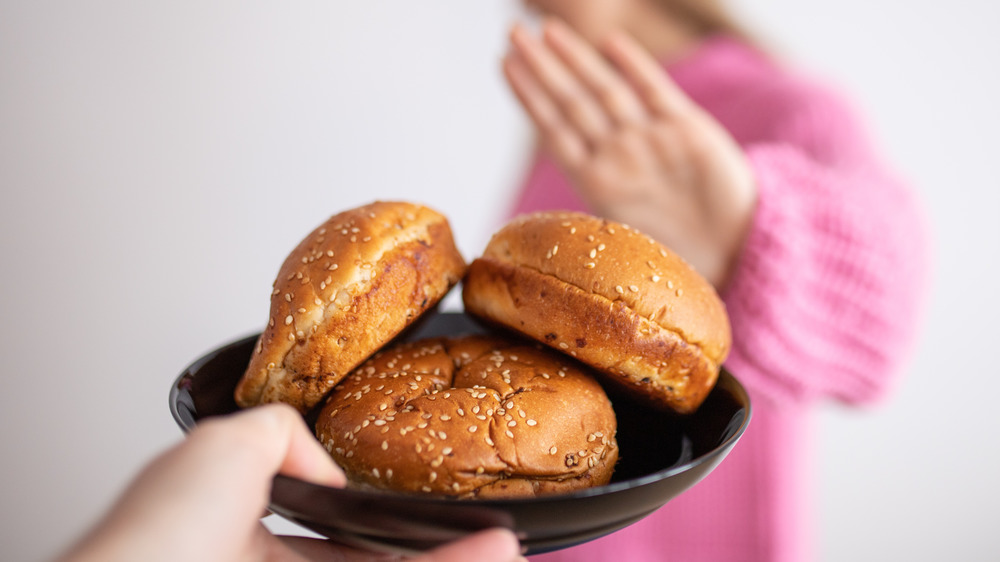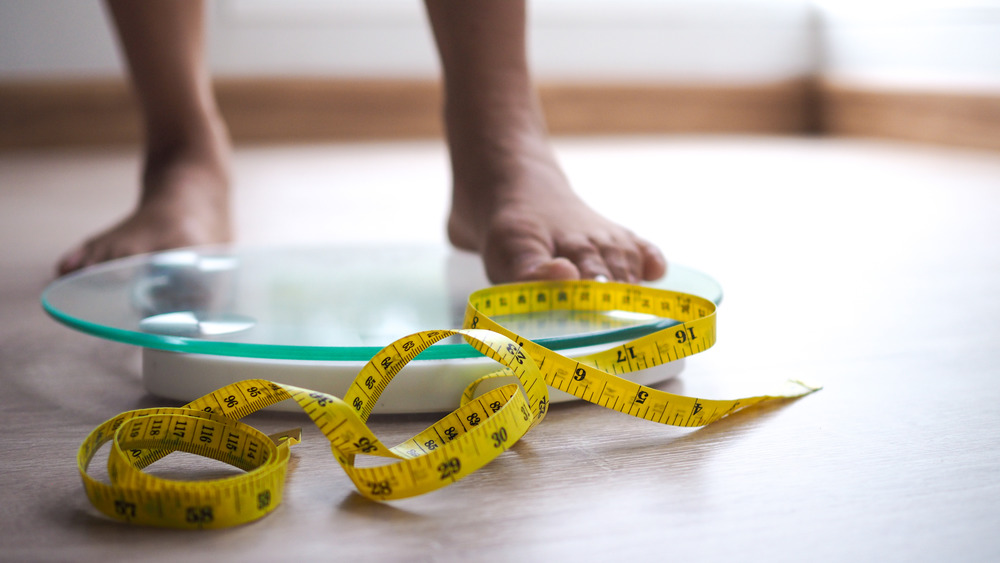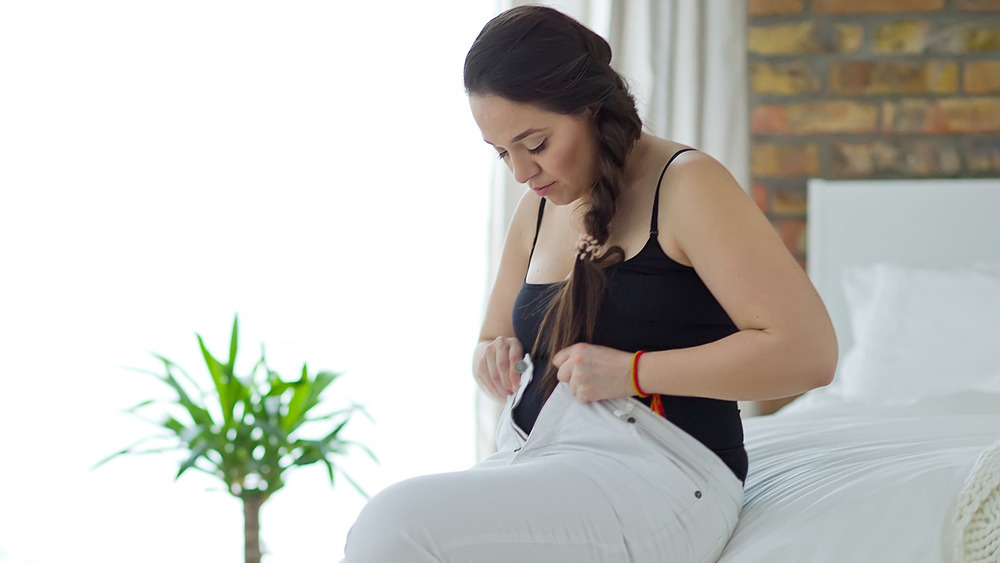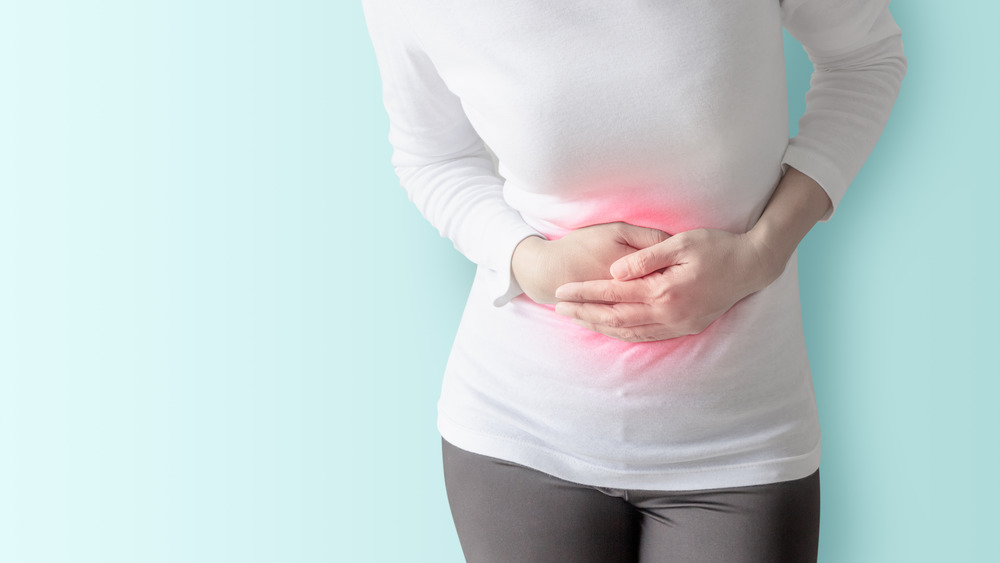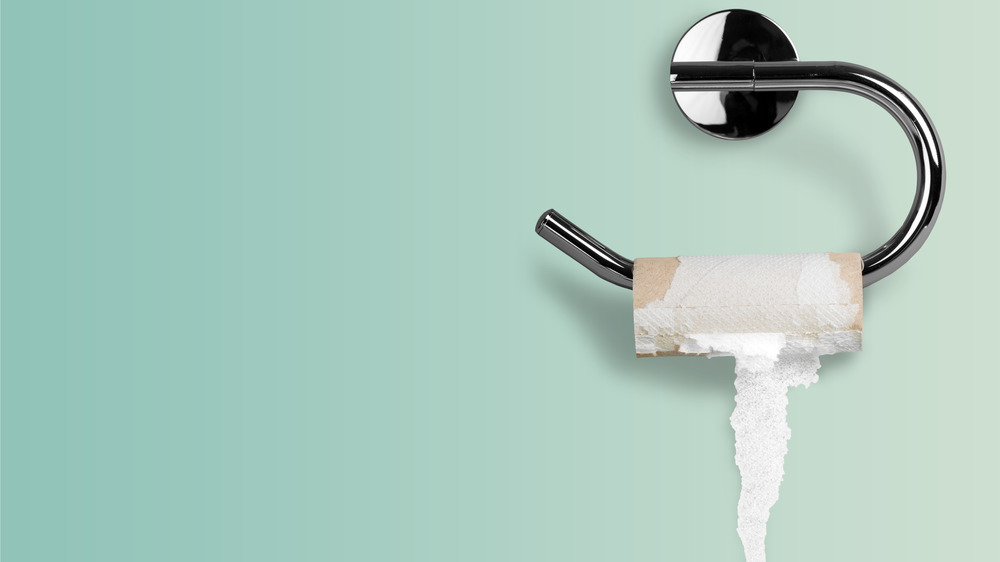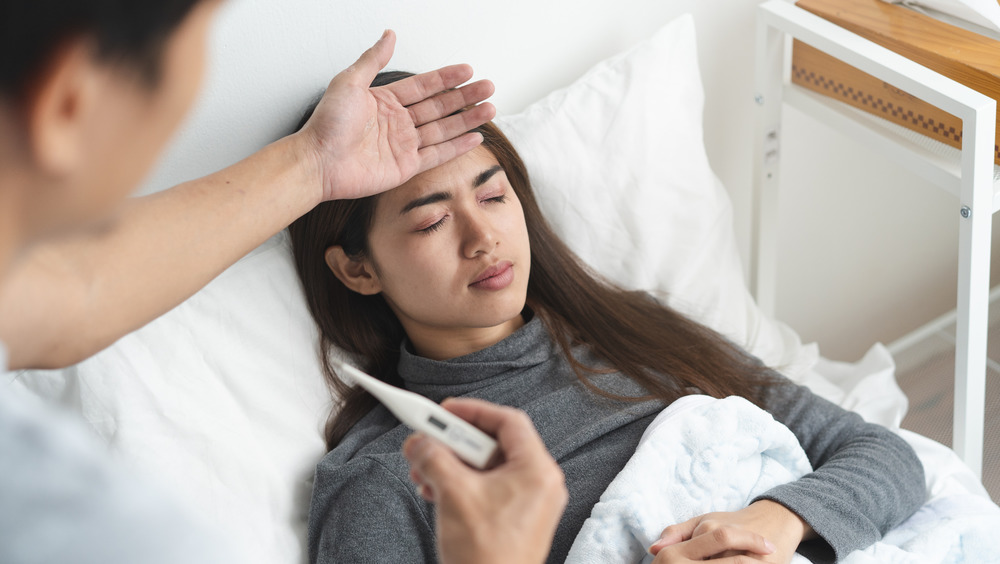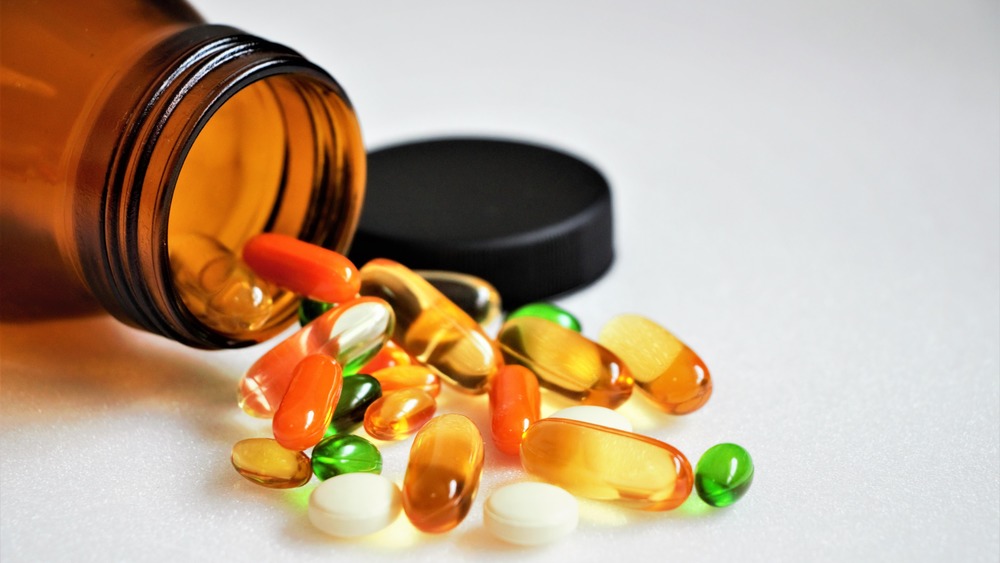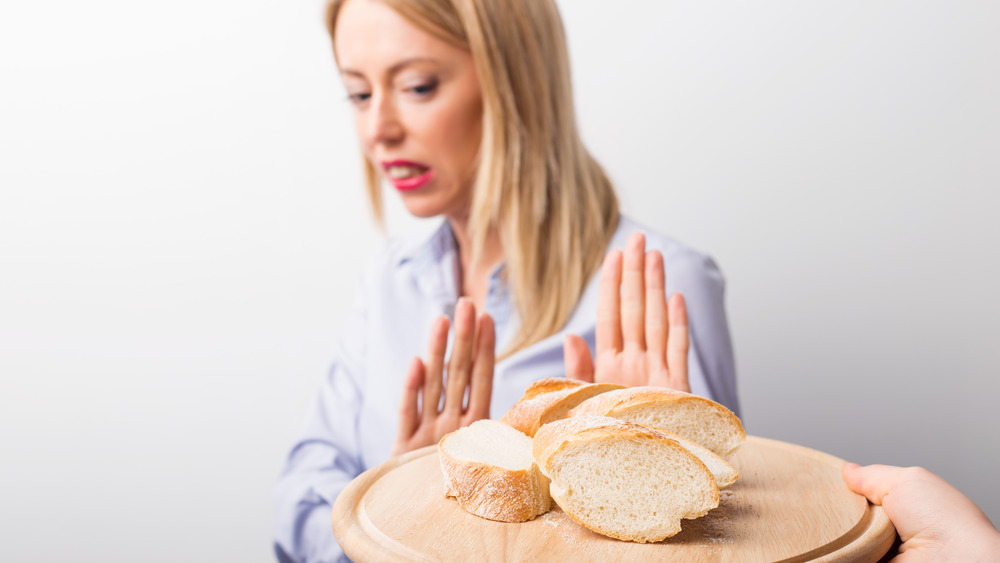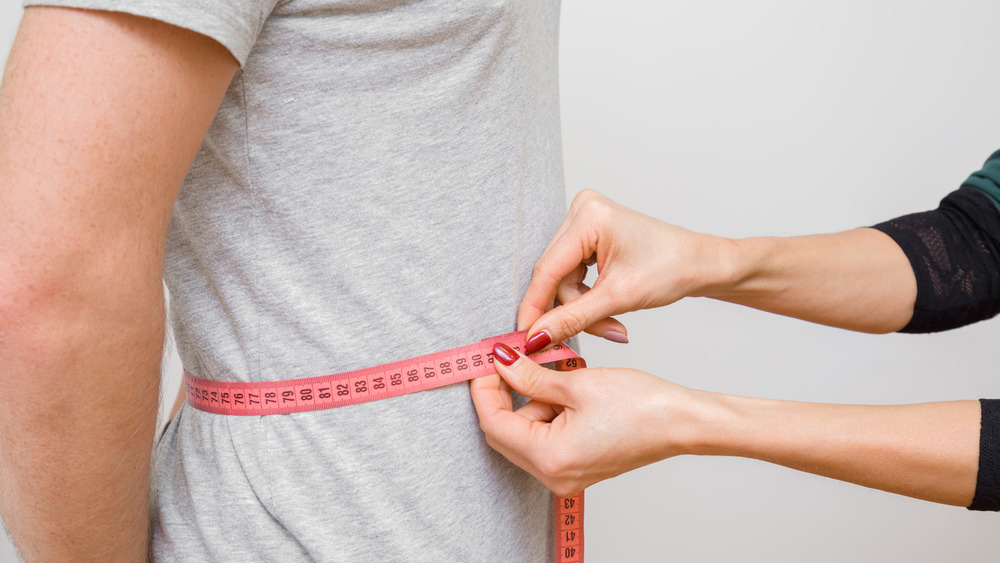When You Stop Eating Carbs, This Is What Happens To You
Low-carb eating patterns have risen in popularity, with most people choosing this approach in order to lose weight (via WebMD). A common diet that reduces carbs is called the ketogenic diet, which tends to restrict carbohydrates to 20 to 50 grams each day, according to a 2020 article published in StatPearls. Glucose (aka carbs) is the main source of energy the body will utilize; without eating glucose, the body will then turn to backup stores in the liver called glycogen. After time, even that will run out and cause our body to choose an alternate source of fuel, as Healthline explained.
When carbs are limited and the body doesn't have enough glucose to feed itself, nutritional ketosis kicks in. Ketone bodies are then produced, which wind up being the fuel source that the body turns to. And if your body needs to make a whole switcheroo in what it uses as its energy source, it comes as no surprise that you'll notice other changes within your body. Here's a look at what exactly happens when you stop eating carbs.
You will probably lose weight soon after giving up carbs
Whether or not you reduce your carb intake for weight loss, chances are you're likely to see the number on the scale move downward. According to a 2020 article published in StatPearls, low-carb approaches tend to cause rapid water weight loss along with some fat loss. The reason behind the quick water loss is due to the body turning to glycogen stores when carbs are eliminated.
When the body metabolizes glycogen, the process requires water. Since glycogen stores deplete within a few days of removing or limiting carbs, that's why the dramatic weight loss occurs, Kristin Kirkpatrick, a dietitian at Cleveland Clinic, explained to Vice.
This weight loss usually doesn't stick around for the long haul though — especially if you find that eating low to no carbs is challenging to upkeep. JAs en Bruning, a registered dietitian and spokesperson for the Academy of Nutrition and Dietetics, told Today, "Research also suggests a tendency to regain any lost weight when eating patterns return to normal."
You could actually gain weight when you stop eating carbs
Although weight loss is pretty common when going low carb, you could notice some weight gain instead. The reason? Well, there's a few. For one, you could be eating too many calories. "The only way someone would gain weight on the keto diet is if they binged on high calorie foods for an extended amount of time such as full-fat dairy, avocados, coconut oil, fatty cuts of meat and nuts," Dr. Luiza Petre, board-certified cardiologist, said to Insider.
Yes, people tend to eat more foods that are high in fat when going low carb, Esther Avant, a certified nutrition coach, told the publication. And fats contain the highest number of calories per gram compared to carbs and protein. Healthy fats are still an important part of every diet, of course, but eating too many can make your daily calorie intake skyrocket quickly.
Ironically, it's also possible to gain weight or stop losing weight if you're not eating enough. "The body will reduce the number of calories it needs when it's presented with a significant calorie deficit," Kyle Kamp, registered dietitian, told Insider.
After cutting carbs, going number 2 may be a little difficult
If you're noticing your bathroom trips have gone from regular to inconsistent, your lack of carbs could be to blame. That's because many carb-rich foods — including whole grains, beans, fruits, vegetables, and legumes — contain dietary fiber. According to the Mayo Clinic, high-fiber diets keep bowel movements regular thanks to its ability to increase the size and weight of your stool and keeping it soft. When stools are bulkier, it makes it easier for our body to pass and prevents constipation.
"Reducing prebiotic fiber can alter the composition and diversity of species of bacteria that live in our large intestine," Zandra Palma, physician and functional medicine expert at Parsley Health, told Health. "[These bacteria] support our metabolic, immune, and cognitive health — and also help keep things moving." If you want to stick with low carb without the back-up, Dr. Palma recommends choosing cruciferous vegetables (like broccoli and cauliflower) or leafy greens, which contain good amounts of fiber without many carbs.
You could be taking many bathroom trips when giving up carbs
Depending on how your body reacts to cutting out carbs, you could wind up being too regular and visiting the restroom often. "Whenever you cut out certain food groups in your diet, an imbalance will occur," Callie Exas, a licensed nutritionist, told Healthline. "Out gut microbiome feeds off short chain fatty acids found in grains, fruits, and vegetables, which are limited on the keto diet."
When carbs are being avoided, individuals often consume higher amounts of protein and fat. Fat takes more work to be broken down by the body, and if it isn't able to make use of all the fat being eaten, the runs ensue. "When you consume too much fat, the body can't keep up with the breakdown and absorption," Exas added. "When unabsorbed fat gets into the small intestines and colon, more water will be pulled in to help its passage, resulting in watery diarrhea."
In addition to upping their fat intake, many low-carb dieters look to artificial sweeteners to replace carbs. Specific kinds, like sorbitol, xylitol, and maltitol, aren't absorbed in the gut very well and create a laxative effect.
When you stop eating carbs, you may get flu-like symptoms
"Keto flu" is a common side effect that comes along with the high restriction of carbohydrates. According to Harvard Health Blog, the keto flu can show itself around two to seven days after starting the diet and brings about symptoms such as fatigue, headaches, foggy brain, irritability, nausea, difficulty sleeping, and constipation. It's important to note this "flu" should never come along with a fever, and it shouldn't be confused with influenza.
A 2020 article published in Frontiers in Nutrition found that symptoms peaked for 300 people in the first week and then began to diminish after four weeks. Although it is dubbed a "flu," it isn't recognized by medical experts, according to Harvard Health Blog, and there isn't a known factor for why it happens, but it could solely be due to the change in diet.
The same article included anecdotal remedies for individuals struggling with keto flu. The most relied upon treatments include upping sodium intake, supplementing with electrolytes, drinking broth (like bone broth), and increasing magnesium and potassium intake.
You risk vitamin deficiencies when cutting out carbs
Eliminating or reducing a specific macronutrient from your diet means there's a higher chance you're missing out on the vitamin and minerals it supplies. When individuals go on a low-carb diet like keto, they often have a goal of keeping their total carb intake for the day under 50 grams, according to the Academy of Nutrition and Dietetics. For this reason, they usually don't consume foods like breads, grains, cereals, milk, and even fruits and some vegetables since they contain carbs. Unfortunately, many of these foods contain nutrients that low-carb foods do not have.
Kathy McManus, registered dietitian and director of the Department of Nutrition at Brigham and Women's Hospital, told Harvard Health Letter, "If you're not eating a wide variety of vegetables, fruits, and grains, you may be at risk for deficiencies in micronutrients, including selenium, magnesium, phosphorus, and vitamins B and C." The Academy of Nutrition and Dietetics also stated that folate and vitamins A and K can be low on low-carb diets.
Your breath may get funky when going low carb
Morning breath will have nothing on the breath you may experience after going low carb. "Keto breath" is a pretty common side effect and confirms that your body is in a state of ketosis. You may recognize the smell too — nail polish! "One type of ketone, acetone, is an ingredient in some nail polish removers, which is why your breath may smell like this familiar scent," Cynthia Sass, registered dietitian, told Health. Some also describe the scent as "fruity," and you may experience a metallic-type taste in your mouth.
On the plus side, this isn't a permanent side effect and usually subsides after a few weeks. "It's more noticeable at first because of the big shift the body is going through," said Sass. Some tips on keeping your breath fresh includes keeping mints handy, lowering protein intake, and slightly increasing carb intake by about 5 grams.
Your sleep changes when you give up carbs
A good night's rest is what helps us wake up feeling refreshed, recharged, and ready to take on the day. How much sleep you need to get every night may be different from what your friends or family need, but in general, adults should get around 7 to 9 hours, according to the National Sleep Foundation. Without that healthy dose of zzzs, your brain can't function normally, and your body gets worn down. Diet and lifestyle habits can impact how much and what type of sleep you get each night, including the limitation of carbs.
A study published in Nutrition Neuroscience found that a very low-carb, ketogenic diet significantly decreased rapid-eye movement (REM) sleep but increased slow wave sleep (SWS) significantly. What does this mean? SWS is referred to as "deep sleep" and typically lasts around 20 to 40 minutes. REM sleep typically doesn't occur until you've been asleep for at least 90 minutes and can last around an hour and make up 25 percent of total sleep. The National Sleep Foundation explained that both of these stages are important, and not getting enough of them can affect thinking, emotions, and physical health.
When cutting carbs, you may not feel as hungry as you'd expect
When starting a new diet and changing your eating patterns, especially to lose weight, many people expect to feel hungry. That's because ghrelin (the "hunger hormone") increases during a diet and tells your brain that you need to eat (via Healthline). On a low-carb or keto diet, though, that may not be the case.
A study published in the European Journal of Clinical Nutrition wanted to find if ketosis had any part in regulating appetite. The results revealed that participants following a ketogenic diet had suppressed ghrelin levels, even after losing 13 percent of their initial weight.
A review and meta-analysis published in Obesity Reviews noted a similar conclusion with individuals following a ketogenic low-carbohydrate diet. Although the changes were small compared to other weight-loss diets, the individuals on the keto diet were less hungry and therefore had less desire to eat. The same review stated that more research would be beneficial to see what the minimum level of ketosis is required to see the same effects.
Your memory could get a little fuzzy when giving up carbs
Just like your muscles, your brain needs fuel. Typically, carbs are the go-to but that obviously changes once carbs are eliminated from your diet (via Healthline). With that switch, researchers wanted to find out how a different fuel source may impact brain function. A 2009 study published in Appetite oversaw cognitive performance in women who either followed a low-carb diet or a reduced calorie diet. The results indicated that complete withdrawal of carbohydrates caused memory-based tasks to worsen, which were then resolved after reintroducing carbs. On the other hand, the same study found that the low-carb group reported less confusion and responded quicker to attention vigilance tasks than the low-calorie group.
However, other research has found conflicting results, like a 2013 study published in Nutrition & Diabetes. Here, researchers compared a low-carb diet and a high-carb diet to see how each impacted cognitive function in adults. After 24 weeks adhering to the diets, both the high-carb and low-carb groups had similar cognitive performance ratings.
Your workouts may suffer when you stop eating carbs
If you're a gym regular who's just gone low carb, you may begin to notice a decline in your workouts. A study published in The Journal of Sports Medicine and Physical Fitness asserted that low-carb diets can cause the body to be more acidic, which impairs anaerobic exercise (shorter, more high intense activity) performance. For that reason, the study compared low-carb and high-carb diets to exercise performance. Sixteen men and women were assigned either high-carb or low -arb diets for four days while still consuming the same number of total calories. In the end, the low-carb group experienced "7% lower peak power ... and 6% lower mean power." The low-carb dieters also had a 15 percent decrease in running distance.
An article published in the Journal of Human Kinetics explained that the reason behind this may be due to the metabolic changes the body goes through when going low carb, resulting in fatigue. Basically, the change in fuel source can affect the brain and increase free tryptophan levels. "Free tryptophan is the precursor to serotonin," the article noted, which is a neurotransmitter that creates a feeling of tiredness and may impact motivation during a workout.
Your blood sugar may drop when you stop eating carbs
When you eat carbohydrates, they get digested and enter your blood stream as glucose to be used as fuel for your cells. When you go carb-free, however, your body starts to run out of glucose and needs to make the switch over to ketones. This process could potentially create a drop in your blood sugar, also known as hypoglycemia, until your body becomes adapted to its new fuel source. This won't happen to everyone, but individuals who are diabetic or pre-diabetic should tread with caution. Jo-Anne Rizzotto, registered dietitian, told Livestrong, "If you want to go on a low-carb diet, it's really important to talk with your diabetes care team, especially if you're taking blood sugar-lowering medications like insulin."
Drinking alcohol while following a low-carb diet should be done with caution as well. After drinking alcohol, a 69-year-old woman who'd been on the keto diet for a year was admitted to the hospital with hypoglycemia, a case report published in the Journal of the Endocrine Society revealed. The reason? Alcohol can disrupt the glucose balance, thus causing hypoglycemia. Symptoms such as weakness, sugar cravings, and mental fogginess can arise.
Your risk of metabolic syndrome may decrease when you cut carbs
When you have a handful of conditions that impact your health, metabolic syndrome occurs. The Mayo Clinic states that such conditions include high blood pressure, high blood sugar, high waist circumference, and high cholesterol levels. Having one of these doesn't mean you automatically have metabolic syndrome, but your odds of getting a serious disease (such as type 2 diabetes or heart disease) increase. Since metabolic syndrome is often correlated with obesity, it's no surprise that weight loss can help to prevent it.
Interestingly, though, a study published in the American Society for Clinical Investigation sought to determine if low carbohydrate intake benefitted those with metabolic syndrome without losing weight. The researchers found that individuals eating low carb maintained their body mass, but were still able to reverse metabolic syndrome due to improving triglycerides, HDL, and LDL cholesterol levels. Restricting carbs also improved fatty acid composition, which has been a common feature found in metabolic syndrome.
Going low carb could be detrimental to your heart and kidneys
Since you're skipping out on carbs, the void is typically filled with the other macronutrients: fat and protein. Both are important aspects of our diet, but too many can cause issues. Andrew Freeman, physician and director of cardiovascular prevention and wellness at National Jewish Health, told The Beet, "With diets like keto and intermittent fasting, social and popular media has been flooded with claims, promises, and warnings that are at best unverified and at worst harmful to your health." Part of the issue is the type of fat eaten on the keto diet. High saturated fat intake may lead to increased risk of heart disease and high lipid levels in the blood.
"High dietary protein intake can cause intraglomerular hypertension, which may result in kidney hyperfiltration, glomerular injury, and proteinuria," an article published in the Journal of the American Society of Nephrology stated. Essentially, all of these conditions negatively impact the kidneys and have the potential to result in chronic kidney disease.

